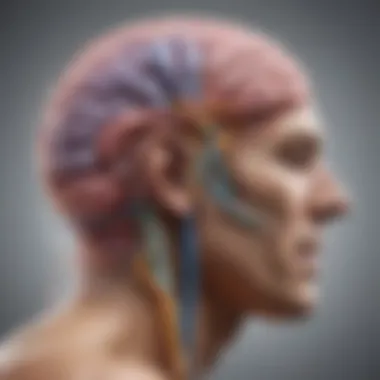Unraveling the Enigma of Low Libido in Men in Their Twenties


Understanding Relationship Dynamics and Challenges
A crucial aspect of delving into low libido in men in their 20s is understanding the intricacies of relationship dynamics and the challenges that may arise. It is essential to recognize how relationships impact mental and emotional well-being and, consequently, libido levels. Exploring common relationship issues faced by men can shed light on potential triggers for low libido. Effective communication techniques play a pivotal role in addressing misunderstandings and fostering healthy relationships. Strategies for resolving conflict in relationships are paramount for maintaining a harmonious bond between partners.
Personal Growth and Development
In the journey of combating low libido, personal growth and development hold immense significance. Self-improvement tips tailored for men in their 20s can boost confidence and self-esteem, positively impacting libido. Setting achievable goals and working towards success not only enhances motivation but also contributes to overall well-being. Managing stress effectively is crucial in maintaining hormonal balance and libido levels in young men.
Masculine Lifestyle Choices
Adopting a masculine lifestyle that aligns with personal preferences and self-care routines is instrumental in addressing low libido. Men's fashion and grooming tips can enhance self-image and confidence, indirectly influencing libido levels. Exploring hobbies and interests that bring joy and fulfillment can mitigate stress and anxiety, contributing to a healthier libido.
Building Strong Connections
Strong connections and social support systems are vital in combating low libido in men. Strengthening friendships and social circles can provide emotional support and a sense of belonging. Nurturing romantic relationships through meaningful gestures and quality time can reignite intimacy and desire. Effective networking techniques can help expand social circles and foster new relationships, enriching personal experiences.
Enhancing Emotional Intelligence
Enhancing emotional intelligence is key to navigating the complexities associated with low libido. Understanding and regulating emotions play a pivotal role in maintaining mental health and libido balance. Cultivating empathy and compassion in relationships fosters deeper connections and understanding among individuals. Cultivating healthy boundaries is essential in safeguarding emotional well-being and fostering healthy relationships.
Foreword
Unraveling the enigma of low libido in young men is crucial in today's society, where holistic well-being is gaining increasing recognition and importance. The significance of this exploration lies in its potential to provide valuable insights and solutions for individuals grappling with this issue. By delving into the core of low libido in men in their 20s, we aim to equip readers with a nuanced understanding of the complexities involved and empower them to make informed decisions regarding their sexual health.
As we navigate through the various sections of this article, ranging from physiological and psychological factors to lifestyle and social influences, we aim to construct a robust guide that not only highlights the key contributors to low libido in young men but also elucidates practical strategies for both prevention and intervention. By presenting a blend of scientific insights and practical recommendations, this article strives to serve as a reliable resource for those seeking knowledge and guidance in this domain.
Defining Low Libido
In this section, we delve into the intricate realm of defining low libido specifically in men in their 20s. Low libido, often termed as reduced sexual desire, can be a distressing issue for young men, impacting not only their physical health but also their emotional well-being. By comprehending the nuances of low libido, individuals can address underlying concerns and work towards enhancing their overall quality of life.


Key Points
- Cultural Perspective: Low libido in men is often viewed from a societal lens, where expectations of masculinity and performance can influence one's perception of sexual desire.
- Biological Basis: Understanding the biological underpinnings of low libido, such as hormonal fluctuations and neurotransmitter imbalances, is crucial in deciphering its origins.
- Psychological Insights: Factors like stress, anxiety, and self-image play a pivotal role in determining one's libido levels, showcasing the intricate interplay between the mind and body.
- Impact on Relationships: Low libido can strain intimate relationships, necessitating open communication and mutual support to navigate challenges effectively.
Benefits
- Self-Awareness: By recognizing the presence of low libido and its potential triggers, individuals can embark on a journey of self-discovery, leading to personal growth and development.
- Improving Communication: Addressing low libido allows for candid discussions with partners, fostering stronger bonds and increased intimacy within relationships.
- Enhanced Well-Being: Resolving issues related to low libido can result in improved mental health, confidence, and overall life satisfaction.
Considerations
Typically, low libido in men in their 20s may stem from a combination of physiological, psychological, and lifestyle factors. Therefore, a holistic approach encompassing medical evaluation, counseling, and lifestyle modifications is crucial for addressing this issue effectively.
Remember, understanding the essence of low libido goes beyond surface-level perceptions, delving into individual experiences and complexities. By grasping the diverse facets that contribute to low libido, men can embark on a transformative journey towards holistic well-being.
Let us now delve deeper into the physiological factors influencing low libido in men in their 20s, dissecting the intricate interplay between hormonal imbalance, nutritional deficiencies, and medical conditions.
In dissecting the enigma of low libido in men in their twenties, delving into the realm of physiological factors uncovers a multifaceted landscape that plays a pivotal role in understanding this phenomenon. Physiological factors, comprising a tapestry of biological mechanisms, hold the key to unraveling the complexities of low libido in young men.
Hormonal Imbalance
Embarking on the exploration of hormonal imbalance as a prime physiological factor influencing low libido in young men reveals the intricate interplay of hormones in the male body. Testosterone, the quintessential male hormone, exerts a profound impact on libido levels, with fluctuations potentially disrupting the delicate balance essential for a healthy sex drive.
Nutritional Deficiencies
Turning the spotlight on nutritional deficiencies unveils a crucial aspect often overlooked in discussions of low libido. Micronutrients such as zinc and vitamin D, essential for hormonal regulation and overall well-being, can significantly influence libido levels when deficient. Recognizing the significance of a balanced diet rich in essential nutrients becomes paramount in mitigating the risk of low libido in young men.
Medical Conditions
Exploring the realm of medical conditions as a physiological factor contributing to low libido unearths a realm where underlying health issues manifest as deterrents to a robust sex drive. Conditions like diabetes, cardiovascular diseases, and thyroid disorders can intricately intertwine with libido levels, emphasizing the critical importance of addressing these conditions proactively for optimal sexual health. Navigating the labyrinth of medical conditions necessitates a holistic approach encompassing medical evaluation and tailored therapeutic interventions to reclaim a vibrant libido in young men.
Psychological Factors


In this segment, we delve into the realm of psychological factors influencing low libido in men in their 20s. It is imperative to recognize the intricate interplay between the mind and sexual desire. Understanding Psychological Factors sheds light on the mental aspects contributing to this issue and holds significance in comprehending its complexities.
Stress and Anxiety
Lifestyle Factors
In the realm of dissecting the conundrum of low libido in men in their 20s, lifestyle factors emerge as pivotal pieces of the intricate puzzle. The lifestyle one leads can significantly impact sexual desire and performance, making it a focal point in understanding and remedying low libido issues. Lifestyle factors encapsulate a myriad of elements ranging from sleep patterns, physical activity, to substance consumption. Delving deeper into these aspects sheds light on their profound effects on libido.
Poor Sleep Habits
Poor sleep habits, a common modern-day affliction, can wreak havoc on various aspects of a man's well-being, including his libido. Research indicates a direct correlation between inadequate sleep and reduced testosterone levels, the hormone crucial for healthy sexual function. The body's natural rhythms and hormonal balance are disrupted by irregular sleep patterns, adversely affecting sexual desire and performance. Adopting habits to prioritize quality sleep can potentially reverse these detrimental effects, offering a natural remedy towards enhancing libido.
Sedentary Lifestyle
The sedentary lifestyle embraced by many in today's tech-driven world exerts a significant toll on libido. Prolonged periods of inactivity lead to poor circulation and issues such as weight gain, which can contribute to low libido. Physical exercise not only enhances overall health but also stimulates the release of endorphins, which can boost one's mood and arousal. Encouraging movement and incorporating physical activities into daily routines can serve as a catalyst in combating low libido associated with a sedentary lifestyle.
Substance Abuse
Substance abuse, encompassing alcohol, drugs, and tobacco, presents a formidable obstacle to optimal sexual health in young men. Excessive consumption of substances can disrupt the chemical balance in the body, leading to a decrease in libido and sexual function. Understanding the detrimental effects of substance abuse on sexual performance is crucial in addressing low libido concerns. Creating awareness about the impact of substance abuse and offering support for individuals struggling with addiction is paramount in restoring healthy sexual function. Seeking professional guidance and engaging in rehabilitation programs can pave the way towards reclaiming sexual vitality.
Social Influences
The realm of social influences on low libido in men in their 20s is a multifaceted arena that plays a crucial role in shaping behaviors and attitudes towards intimacy and desire. Understanding the impact of social factors on an individual's libido can provide valuable insights into the underlying causes of this issue. By delving into peer pressure, media influence, and cultural norms, we can unravel the intricate web of societal expectations and norms that may contribute to decreased sexual drive among young men.
Peer Pressure
Peer pressure, a pervasive force in social dynamics, can significantly influence an individual's perception of masculinity and sexual activity. The need to conform to peer expectations regarding sexual performance and frequency may inadvertently place undue pressure on men in their 20s, leading to stress and anxiety related to their libido. Exploring ways to navigate peer pressure constructively and prioritize personal well-being over societal standards is essential in fostering a healthy approach to intimacy and desire.
Media Influence
The pervasive presence of media in modern society exerts a substantial impact on how young men perceive and interpret sexuality. Portrayals of hypersexualized masculinity in movies, TV shows, and advertisements can create unrealistic expectations regarding libido and sexual prowess. Moreover, the glorification of casual sex and instant gratification in media narratives may skew one's understanding of genuine intimacy and emotional connection, potentially influencing libido levels among young men.


Cultural Norms
Cultural norms and traditions play a significant role in shaping attitudes towards sex and relationships within a society. In certain cultures, rigid expectations regarding gender roles, sexual expression, and relationships can contribute to feelings of inadequacy or performance anxiety in men in their 20s. Understanding the influence of cultural norms on individual sexual experiences is crucial in addressing low libido issues effectively, allowing for a nuanced approach that respects diverse backgrounds and perspectives.
Diagnosis and Treatment
Low libido in men in their 20s poses unique challenges that often require a thorough diagnosis and tailored treatment strategies. Understanding the underlying causes is paramount in addressing this issue effectively. Diagnosis involves a comprehensive medical evaluation encompassing various aspects from physical health to psychological well-being. Physicians may conduct thorough assessments, including health history, physical examinations, and potentially specialized tests to pinpoint the root cause. The diagnosis phase sets the foundation for developing a targeted treatment plan that caters to the individual's specific needs. Importantly, treatment approaches vary depending on the identified cause of low libido, ranging from medical interventions to lifestyle adjustments.
Medical Evaluation
In the realm of low libido, a medical evaluation serves as a critical initial step in identifying potential health issues contributing to diminished sexual desire. Physicians may delve into the individual's medical history, focusing on past illnesses, medications, and lifestyle habits. Physical examinations aimed at assessing hormonal levels, further probes into nutritional deficiencies, and may also involve screening for any underlying medical conditions. Through these evaluations, healthcare providers can form a clearer picture of the individual's overall health and potential factors affecting libido.
Therapeutic Approaches
Therapeutic approaches for low libido encompass a spectrum of interventions aimed at restoring sexual drive and overall well-being. Depending on the root cause identified during diagnosis, treatments may include hormone therapy, medication adjustments, or psychotherapy sessions to address underlying psychological factors. Individuals may also benefit from holistic approaches such as mindfulness practices, stress management techniques, or couple's therapy to enhance intimacy. The key lies in tailoring the therapeutic approach to the specific needs and circumstances of each individual, ensuring a comprehensive and effective treatment plan.
Lifestyle Modifications
Incorporating lifestyle modifications is often a fundamental aspect of addressing low libido in men in their 20s. Simple changes like prioritizing adequate sleep, engaging in regular physical activity, and maintaining a balanced diet can significantly impact sexual desire. Additionally, reducing stress levels, abstaining from substance abuse, and fostering healthy relationships play pivotal roles in improving libido. By adopting sustainable lifestyle modifications, individuals can cultivate an environment conducive to heightened sexual wellness and overall quality of life.
Preventive Measures
Key Elements of Preventive Measures
Incorporating Preventive Measures involves a multifaceted approach encompassing physical well-being, mental health, and lifestyle choices. From cultivating healthy habits to fostering a supportive environment, preventive actions play a crucial role in maintaining balanced sexual health and overall wellness.
Taking proactive steps today can pave the way for a satisfying and fulfilling intimate life tomorrow.
Benefits of Proactive Intervention
Engaging in preventive measures not only mitigates the risk of developing low libido but also promotes holistic health and vitality. By attending to early signs of distress or imbalance, individuals can potentially avert more significant challenges in the future and nurture a harmonious relationship with their bodies and partners.
Considerations for Effective Prevention
- Awareness and Education: Understanding common triggers and risk factors for low libido empowers individuals to make informed choices regarding their health and well-being.
- Communication: Open dialogue with healthcare providers or mental health professionals can offer valuable insights and guidance on implementing tailored preventive strategies.
- Self-Care Practices: Prioritizing self-care through adequate rest, nutritious diet, regular exercise, and stress management techniques forms the cornerstone of preventive measures.
- Relationship Dynamics: Nurturing healthy relationships based on trust, communication, and mutual respect can significantly impact sexual well-being and libido levels.
By embracing a proactive stance towards Preventive Measures, young men can cultivate resilience, enhance self-awareness, and pave the way for a fulfilling and rewarding journey towards optimal sexual health.



